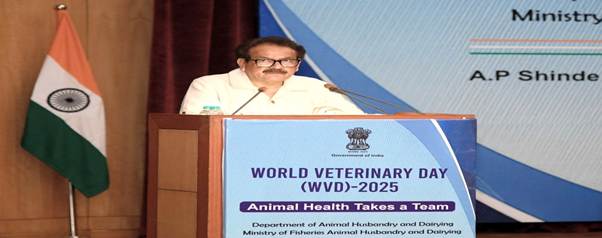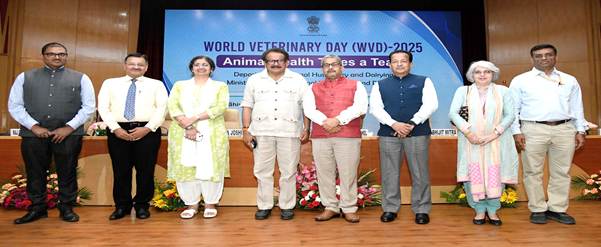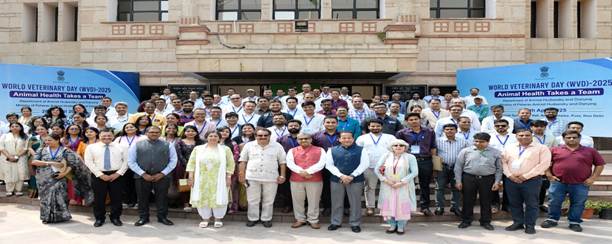
In a tribute to the silent sentinels of India’s livestock economy, the Department of Animal Husbandry and Dairying under the Ministry of Fisheries, Animal Husbandry and Dairying, celebrated the World Veterinary Day 2025 with a National Workshop in New Delhi.
The event was inaugurated by Prof. S. P. Singh Baghel, Union Minister of State for Fisheries, Animal Husbandry and Dairying and Panchayati Raj, who hailed the veterinary community as the backbone of rural economy and national biosecurity. India is home to over 536 million livestock, the largest in the world and nearly 70% of rural households depend on animals for income, food, and security.

Yet, the people who ensure those animals remain healthy are rarely in the headlines, he added. Union Minister of State in his address said that There is no healthy India without healthy animals, while emphasizing upon the government’s commitment to modernizing veterinary infrastructure, enhancing skill development, and future-proofing India’s animal health systems.
Highlighting this year’s theme, “Animal Health Takes a Team,” he stressed the importance of collaborative efforts among veterinarians, para-veterinary staff, scientists, and public health professionals to ensure integrated animal, human, and environmental health.

Prof. Baghel spotlighted key initiatives under the national vaccination program like the National Animal Disease Control Programme (NADCP), which aims to eliminate Foot and Mouth Disease (FMD) by 2030, noting that over 114.56 crore FMD vaccines and 4.57 crore Brucellosis vaccines have been administered in the country so far. The NADCP aims to control FMD by 2025 and eradicate it by 2030 with vaccination.
Prof. S.P. Singh Baghel emphasized the vital role of indigenous breeds of livestock in strengthening the country’s animal husbandry sector. He noted that these breeds are not only well-adapted to local climatic conditions but also play a crucial role in ensuring sustainable and resilient livestock production systems.
He stressed the importance of adopting advanced reproductive technologies, particularly the use of sex-sorted semen, goal of achieving 100% use of in vitro fertilization (IVF) to enhance productivity and breed quality. The Union Minister of State praised the use of digital platforms like the National Digital Livestock Mission (Bharat Pashudhan) for traceability and disease monitoring.
Addressing the rising threat of zoonotic diseases, he emphasized India’s adoption of the One Health approach, commending veterinarians for their role in disease surveillance, inter-sectoral coordination, and early warning systems to protect public health.
Joining the national workshop virtually Secretary, Department of Animal Husbandry and Dairying (DAHD) Alka Upadhyaya called for a comprehensive overhaul of India’s veterinary ecosystem. Speaking at the World Veterinary Day 2025 event, she emphasized that veterinarians have significantly contributed to enhancing livestock productivity, making India the largest dairy producer globally, second in table egg production, and the fourth-largest meat producer.
While India has become aatmanirbhar in advanced technologies such as IVF, sex-sorted semen, cattle immunization, and dairy equipment manufacturing, the Secretary highlighted the acute shortage of veterinary professionals across the country. She urged for an increase in veterinary education seats, the establishment of state-of-the-art facilities in veterinary colleges, and a curriculum that provides students with practical expertise in surgeries and livestock medical care.
She further advocated for stronger public-private partnerships, and more academic conferences to modernize veterinary education. She also laid emphasis on mainstreaming of animal welfare initiatives while improving productivity. Addressing the growing threat of zoonotic diseases, Ms. Alka Upadhyaya stressed upon the need for a strong surveillance system, synchronized vaccination programs across states. Veterinarians are the first line of defense in ensuring national biosecurity, she concluded.
Joining virtually from Rome, Dr. Thanawat Tiensin, Assistant Director-General and Chief Veterinarian at the Food and Agriculture Organization (FAO), lauded India’s pivotal role in global One Health efforts, and praised the country’s recent recognition under the Pandemic Fund for Animal Health Preparedness, a major global endorsement of India’s leadership in veterinary public health.
In his address, Dr. Abhijit Mitra, Animal Husbandry Commissioner and Chairman of the Animal Welfare Board of India, highlighted India’s progress in mass vaccination campaigns, early disease detection, and the use of digital tracking systems to strengthen animal health services.
He emphasized the role of veterinarians as the unseen protectors of food systems and crucial defenders against future pandemics. He drew attention to the vital connection between animal welfare and public health, asserting that animal welfare is not just an act of compassion but a fundamental pillar for ensuring food safety and healthier livestock.
This year’s global theme of World Veterinary Day 2025 is Animal Health Takes a Team, underscores the idea that animal health isn’t a solo mission it’s a collective national effort involving vets, scientists, public health experts and farmers. The event spotlighted the power of collaboration in protecting animal health, recognising that veterinarians, scientists, public health experts, and farmers form an interdependent network that safeguards not only livestock but the health and economy of the nation.
The workshop also featured high-impact technical sessions on Use of Generic Medicines in animal husbandry to improve accessibility and affordability, the veterinarian’s role in preventing zoonotic transmission of diseases like avian influenza, strengthening Integrated Disease Surveillance and data sharing between human and animal health sectors alongside an engaging online national quiz, connecting hundreds of young veterinary students to the national conversation.
The event was also attended by distinguished dignitaries and stakeholders, including, Varsha Joshi, Additional Secretary, DAHD, Dr. Ramashankar Sinha, Additional Secretary, DAHD along with other senior officials from ICAR, National Veterinary Councils, FAO, WOAH, WHO and Directors of national research institutes and Vice Chancellors of several veterinary universities.
The event saw participation from over 250 delegates and was live-streamed across India, attracting more than 3,000 virtual attendees including veterinary professionals, students, researchers, and farmers reflecting growing public awareness and interest in animal health.

